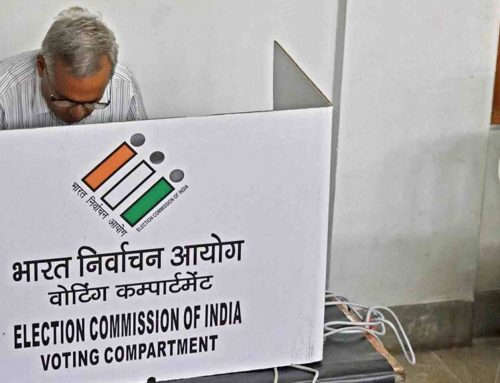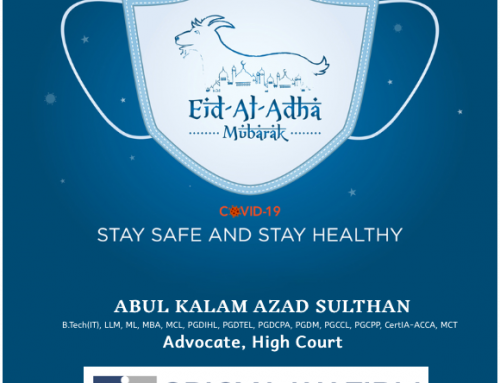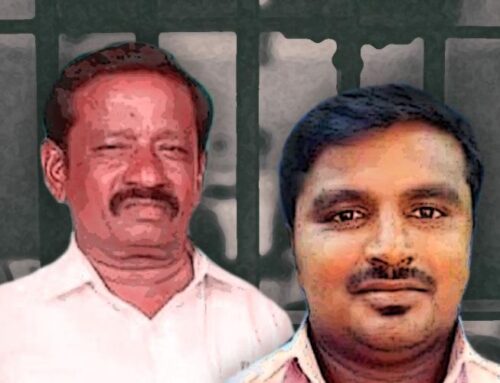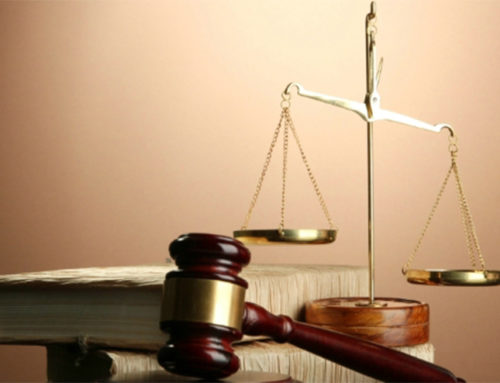– Compiled by Abul Kalam Azad Sulthan, Advocate, Madurai Bench of High Court of Judicature at Madras.
1. Cheque bouncing cases charged U/s 138 of Negotiable Instruments Act is tried by
a) Bank Tribunal
b) Consumer Forum
c) Magistrate Court
d) Sessions Court
Answer: c
Explanation: Section 142 (c) of the Negotiable Instruments Act reads as follows:
2. Under Section 59 to 60 of Indian Evidence Act the ‘Oral statement’ means
a) All statements made before the court by the witness
b) All statements made before the police by the accused
c) All statements of facts which a witness heard to say
d) All of the above
Answer: a
Explanation: Section 3 (Interpretation Clause) of Indian Evidence Act, reads as follows:
“Evidence” – “Evidence” means and includes
(1) all statements which the Court permits or requires to be made before it by witnesses, in relation to matters of fact under inquiry;
such statements are called oral evidence;
Hence answer is a.
3. Under the Evidence Act, ‘Court’ includes
a) All Judges
b) All Magistrates
c) All Arbitrators
d) (a) and (b)
Answer: d
Explanation: Section 3 (Interpretation Clause) of Indian Evidence Act, reads as follows:
Court”. —“Court” includes all Judges and Magistrates, and all persons, except arbitrators, legally authorized to take evidence.
Hence the correct answer is d.
4. Admissibility of contents of electronic records may be proved in accordance with the provisions of
a) Under Section 61 of the Indian Evidence Act
b) Under Section 65 of the Indian Evidence Act
c) Under Section 65-B of the Indian Evidence Act
d) None of the Above
Answer: c
Explanation: Section 65A of the Indian Evidence Act reads as follows:
65A. Special provisions as to evidence relating to electronic record:
The contents of electronic records may be proved in accordance with the provisions of section 65B.
Hence the correct answer is c
5. Which is not a public record as per the provisions of Indian Evidence Act
a) Documents forming the acts or records of the sovereign authority
b) Documents forming the acts or records of official bodies, tribunals
c) Documents and correspondence from Advocate and Notary office
d) Documents and circulars from University of Delhi
Answer: c
Explanation: According to Section 74 of Indian Evidence Act,
74. Public documents.—The following documents are public documents :— (1) Documents forming the acts, or records of the acts— (i) of the sovereign authority, (ii) of official bodies and tribunals, and (iii) of public officers, legislative, judicial and executive, [of any part of India or of the Commonwealth], or of a foreign country; [of any part of India or of the Commonwealth], or of a foreign country;”
Hence the correct answer is c
6. Section 67 of Motor Vehicle Act 1988 provides
a) Possession of driving license while driving
b) Possession of insurance certificate and PUC Certificate in the vehicle
c) Revoking driving license if drunk driving is detected
d) State Government’s power to control the road transport
Answer: d
Explanation: The subtitle given to Section 67 is “Power to State Government to control road transport.—”
Hence the correct answer is d
7. The term ‘Tort’ is a
a) Latin Word
b) French Word
c) English Word
d) Italian Word
Answer: b
Explanation: According to Merriam Webster’s, Tort came into English straight from French many centuries ago, and it still looks a little odd. Its root meaning of “twisted” (as opposed to “straight”) obviously came to mean “wrong” (as opposed to “right”).
Hence the correct answer b
8. In Tort, what is ‘vicarious liability’?
a) A person is generally liable for his own wrongful act
b) A person is liable for the wrongful act done by other person
c) A person is liable for the wrongful act in his absense
d) None of the above
Answer: b
Explanation: Vicarious liability imposes liability on one person for a tortious act committed by another. Hence the correct answer is b.
9. Under Section 2(1)(f) of Consumer Protection Act, 1986, ‘defect’ is meant by any fault, imperfection or shortcomings in ___________ in relation to the goods
a) Quality and Quantity
b) Potency
c) Purity or Standard
d) All of the above
Answer: d
Explanation: Section 2(1)(f) of Consumer Protection Act, 1986 reads as follows:
“defect” means any fault, imperfection or shortcoming in the quality, quantity, potency, purity or standard which is required to be maintained by or under any law for the time being in force or [under any contract, express or implied, or] as is claimed by the trader in any manner whatsoever in relation to any goods;
Hence the correct answer is d.
10. Which of the following falls under the categories of Act of God
a) Storm and Cyclone
b) Extra ordinary rainfall or flood
c) Lightning and thunder
d) All of the above
Answer: d
Explanation: In P.K. Kalasami Nadar v. K. Ponnuswami Mudaliar and Ors., the Apex court defined Act of God as “…an act of god will be an extra-ordinary occurrence due to natural causes, which is not the result of any human intervention”
Hence the correct answer is d.
11. Income Tax act was enacted in
a) 1951
b) 1961
c) 1971
d) None of the above
Answer: b
Explanation: The name of the act, “The Income Tax Act, 1961” is self explaining the answer 🙂
12. ‘Income’ is defined under Section 24 of the Income Tax act, as
a) Profits and gains
b) Dividend
c) Voluntary contribution received by a Trust for charitable purpose
d) All of the above
Answer: d
Explanation: Section 2(24) in The Income- Tax Act, 1995
(24) ” income” includes-
(i) profits and gains;
(ii) dividend;
(iia) voluntary contributions received by a trust created wholly or partly for charitable or religious purposes or by an institution established wholly or partly for such purposes or by an association or institution referred to in clause (21) or clause (23), or by a fund or trust or institution referred to in subclause (iv) or sub- clause (v) of clause (23C) of section 10. Explanation.- For the purposes of this sub- clause,” trust” includes any other legal obligation;
Hence the correct answer is d.
13. Provisions of Section 80 of CPC are binding on
a) High Court
b) The Court of Civil Judge
c) The District Judge
d) All of the above
Answer: d
Explanation: Section 80 of Civil Procedure Code provides that no suit shall be instituted against the Government (including the Government of the State of Jammu and Kashmir) or against a public officer in respect of any act purporting to be done by such public officer in his official capacity, until the expiration of two months next after notice in writing. This is binding for High Court, The Court of Civil Judge and the District Court based on the pecuniary jurisdiction. Hence the correct answer is d.
14. Temporary Injunction can be granted
a) Suo moto
b) Ex parte
c) Hearing both parties
d) None of the above
Answer: b
Explanation: As per Rule 3 of Order XXXIX of the Civil Procedure Code the power to grant an ex–parte interim injunction in exceptional circumstances based on sound judicial discretion to protect the plaintiff from apprehended injury may be granted.
Hence the correct answer is b.
15. Right to appeal is a
a) Natural right
b) Inherent right
c) Statutory right
d) Delegated right
Answer: c
Explanation: A right to appeal is not a natural or inherent right, it is a creature of statute and there cannot be any right of appeal unless it is expressly provided in any statute. Hence the correct answer is c.
16. The last amendment to the Indian Succession Act was made in
a) 2000
b) 2001
c) 2002
d) 2004
Answer: c
Explanation: The act was last amended on 27th May, 2002. THE INDIAN SUCCESSION (
Hence the correct answer is c.
17. Which is the correct statement:
a) There can be a will without a codicil
b) There can be a codicil without a will
c) Every will has a codicil
d) A codicil proceeds a will
Answer: a
Explanation: If a testator intends to make a few changes to the Will, without changing the entire Will, he can do so by making a codicil to the Will. Section 2(b) of the Indian Succession Act defines a codicil as: ‘
Hence there can be a will without a codicil. Hence the correct answer is a.
18. As per Section 63 of Indian Succession Act, a Will should be attested by
a) By two witnesses
b) By two or more witnesses
c) Only one witness who is not a relative of testator
d) None of the above
Answer: b
Explanation: According to Section 63 (c):
(c) The Will shall be attested by two or more witnesses, each of whom has seen the testator sign or affix his mark to the Will or has seen some other person sign the Will, in the presence and by the direction of the testator, or has received from the testator a personal acknowledgement of his signature or mark, or the signature of such other person; and each of the witnesses shall sign the Will in the presence of the testator, but it shall not be necessary that more than one witness be present at the same time, and no particular form of attestation shall be necessary.
Hence the correct answer is b.
19. ‘Iddat’ under Mohammadan law refers to
a) A gift made on the occasion of marriage
b) The right of the husband to divorce his wife
c) Attaining of puberty
d) None of the above
Answer: d
Explanation: Iddat is a period of chastity which a Muslim woman is bound to observe after the dissolution of her marriage by the death of her husband or by divorce, before she can lawfully marry again. Hence the correct answer is d.
20. Under the Christian Marriage Act the marriage registrar for any district is appointed by
a) State Government
b) The Central Government
c) The Clergymen of the Church
d) High Court Judges
Answer: a
Explanation: Section 7 of the Indian Christian Marriage Act, 1872 reads as follows:
7. Marriage Registrars.—The State Government may appoint one or more Christians, either by name or as holding any office for the time being, to be the Marriage Registrar or Marriage Registrars for any district subject to its administration. Senior Marriage Registrar.—Where there are more Marriage Registrars than one in any district, the State Government shall appoint one of them to be the Senior Marriage Registrar. Magistrate when to be Marriage Registrar.—When there is only one Marriage Registrar in a district, and such Registrar is absent from such district, or ill, or when his office is temporarily vacant, the Magistrate of district shall act as, and be, Marriage Registrar thereof during such absence, illness, or temporary vacancy. STATE AMENDMENT Karnataka:—In section 7, for the words “Magistrate of the District”, the words “District Magistrate” shall be substituted. [Mysore Act 13 of 1965, sec. 66 and Sch, read with Act 31 of 1973, sec. 5.]
Hence the correct answer is a.
21. Which one is not a fundamental right?
a) Right to freedom of Assembly
b) Right to Property
c) Right to Equality
d) Right to freedom of speech and expression
Answer: b
Explanation: In the year 1977, the 44th amendment removed the Right to Property from the Part III (Fundamental Rights) of the Constitution of India. But, it is added under Article 300-A, and hence right to property is a statutory right.
22. In Menaka Gandhi case it was observed that
a) Confiscation of passport was correct
b) Right to go abroad is not within the meaning of Article 21
c) Right to go abroad is within the ambit of Article 19(1) (A) but the confiscation of passport is not accordance to the law
d) None of the above
Answer: c
Explanation: The Apex Court in this case (https://indiankanoon.org/doc/1766147/) observed “Right to go abroad is within the ambit of Article 19(1) (A), but the confiscation of passport is not accordance to the law”. Hence the correct answer is c.
23. Reasonable restrictions can be imposed on the right of free movement
a) In the interest of general public
b) In the interest of political leaders
c) In the interest of women safety
d) All of the above
Answer: a
Explanation: The State under clause 5 of Article 19 may impose reasonable restrictions on the freedom of movement on two grounds: (1) In the interest of general public, and (2) For the protection of interests of the Scheduled Tribes.
Hence the correct answer is a.
24. Which of the following can claim Article 19 of Consitution
a) A Company
b) A Corporation
c) Only Citizens
d) Citizens and Aliens
Answer: c
Explanation: The Article 19 of the Constitution of India reads as follows:
19. Protection of certain rights regarding freedom of speech etc
(1) All citizens shall have the right
25. Clause (3) of Article 20(i) of the Indian Constitution says that no accused person shall be compelled to be
a) An accused
b) A witness
c) A witness against himself
d) Hostile Witness
Answer: c
Explanation: Article 20(3) reads as follows:
Article 20(3) in The Constitution Of India 1949







Leave A Comment